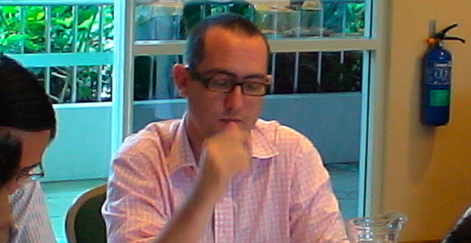Aug 29
Thinking About Wikis - and Wiki Raids

When Matt Moore thinks about things, all sorts of interesting stuff surfaces. Right now, he’s thinking about wikis. Yes, wikis.
So while he’s thinking about it, here’s a link to another interesting wiki case from Maish Nichani. And here’s a wiki launched by Andrew McAfee for writing wiki case studies - well… enterprise 2.0 case studies really, but there are a few good wiki cases in there!
And here’s a recipe for an activity we tried some months back for a group that wanted to start using a wiki to draft a new set of policies collaboratively, but (a) weren’t too familiar with wiki technology and (b) weren’t too familiar with the new policy template they were using.
Aug 29
Can You Wear This Teeshirt?
For those of you who remember the AOK banning debacle a couple of months ago, a sequel.
Dave Snowden (whose account of the affair is here, here and here) threatened to make a tee shirt about the banning to make a point that dissent can’t be suppressed quite so easily in a connnected world, and that censorship in online forums is just plain silly. (This has nothing to do with Uncle Jerry’s Tees, by the way).
So I had a chat with our (brilliant) resident artist Joseph Tey and we came up with this:

Dave lists himself, Valdis Krebs, Bob Buckman and myself as eligible to wear this tee shirt. Technically I wasn’t banned, I withdrew from the group because I didn’t like the artificiality of a censored forum or the arbitrariness and confusion that stemmed from Jerry constantly shape-shifting between the roles of being a sponsor, moderator, facilitator and contributor. But I might still wear it just to make a point about authenticity of conversation and ownership in communities. Dave Snowden has the high resolution image if you want to be “Banned” too.
Aug 27
Big Jobs, Meaty Jobs
Some substantial jobs available right now:
Cognitive Edge (based in Singapore) is hiring for a number of very interesting positions:
Training & Office Manager
Consultant
Test Support and QA Manager
Web Developer
Dow Jones are beefing up their taxonomy consulting services worldwide, and have some very senior positions open:
Global Director of Semantic Technology Solutions
• Providing thought-leadership in the adoption of emerging semantic technologies as a means to add value to information products and thereby drive revenue.
• Overseeing software development of Synaptica® from Dow Jones, an enterprise-class taxonomy and ontology management software product.
• Leading the development of new taxonomies and metadata that can be used to enrich information content.
Global Taxonomy Director
• Coordinate initiatives with the regional Client Solutions Directors to achieve and exceed Dow Jones Taxonomy Services revenue and operational goals, leveraging Dow Jones’ taxonomy and editorial expertise.
• Define and communicate Taxonomy capabilities, services and pricing models.
• Ensure structures and procedures are in place to achieve the successful delivery of taxonomy engagements to time, to budget and to satisfactory quality standards.
Aug 20
Complex Learning Online
I’ve just played BT’s Better Business Game (thanks Kim for the link). It’s a simulation-slash-decision-game that takes you through a year’s worth of decisions with some impact on corporate social responsibiity. As a game it was an elegant way of pointing out that corporate social responsibility is about being able to manage different sets of stakeholder relationships, sometimes at odds with each other.
I didn’t do too well, I pretty much alienated my shareholders, and my top rating was from the external pressure groups. So when the Board lets me go, I guess I know where I can look for a job… However, the closed options approach of a simulation (three choices for each decision point) and the ongoing graph of stakeholder sentiment meant that towards the end I was making decisions just to try to keep all my stakeholders happy, and not so focused on doing the right thing any more. This worries me a bit, because in real life you can be inventive, and in real life, you can manage relationships and trust in other ways than single-point-decisions. That’s why I prefer decision games to closed-option simulations with predetermined answers built in. And I don’t think CSR is just about keeping stakeholders happy. It’s important to keep them on board, but it involves more than that, and the game suggests your popularity rating is the main thing.
So a neat learning device, not sure completely about the messages underneath.
Aug 20
A Constant Succession of Eyes

The title of this blog post is a half-remembered snip from Jane Jacobs’ masterpiece The Death and Life of Great American Cities. She’s talking about the importance of the (populated) sidewalk in a city as a sensemaking device – “the constant succession of eyes” is the flow of people who observe, stay aware, update their sense of what’s going on, share or actively inhibit patterns such as fashions, behaviours, opportunities.
In a sense, all of social software picks up this idea of a constant flow of eyes by providing the feedback loop that turns content on the web into a virtual sidewalk, where perceived patterns can be shared. The idea has been picked up explicitly by IBM’s Watson Labs (more specifically their Visual Communication Lab) in an experiment called Many Eyes. It’s a social site for creating and sharing and discussing information visualisations with some really nice visualisation tools to play with. Here’s the idea behind the site – what interested me particularly (apart from the visualisations) was the link to storytelling:
“Many Eyes is a bet on the power of human visual intelligence to find patterns. Our goal is to “democratize” visualization and to enable a new social kind of data analysis… In 2003, Fernanda created a program to visualize an individual’s email archives. Given the personal nature of email, when she ran a study on the visualization she took great pains to ensure that each person’s visualization would be completely private. But to her surprise, many of the study participants immediately sought out ways to share the images, mailing screenshots around or just calling friends over to see the program in action. This experiment revealed the intensely social side of visualizations, where discussion and storytelling are just as important as data analysis.”
You need to register to use it and there seem to be problems right now with the register function (it’s IBM)... but well worth a visit and a bit of patience. Thanks to Cory Banks via actKM for this link.
Aug 18
Self Improvement?
It’s common on walking into Asian bookstores (especially in airports) to find a good twenty feet or more of shelving devoted to self improvement books along the lines of “How to Become A Multimillionaire with 50 cents in Your Pocket”… and I often think this is symptomatic of the pragmatic appetite for success you find in many Asian countries.
So I was intrigued by this whole block of shelving in the bookstore at Canberra airport devoted to a close analysis of the methods and tactics of Australian criminals. Given that this airport bears a constant traffic of politicians, bureaucrats and lobbyists attending court in the nation’s capital, I am tempted to speculate on what this says about the state of Australian politics. But I won’t.

Aug 18
Take Your Wiki on Holiday With You

This little tool the tiddlywiki is very very cool. It’s billed as a reusable personal journal tool which works very much like a wiki, but has a couple of really really wicked features.
Number one, it’s all packed up inside a single html file, so as you’ll discover when you navigate to the site, just being on the site means you’ve already downloaded the tool. Just save the page as an html file to your computer and you’ve got it.
Aug 18
On Becoming Extinct
Here’s my keynote from Wednesday in a video podcast format, with the audio synchronised to the slides. The audio isn’t great, but generally audible for the most part. There are two main parts in the 48 minute session: the first looks at responses from almost 50 information managers on the current status and the future of the profession of information management. The second part is a sustained critique of the profession’s passivity, lack of assertiveness and sense of accountability, and calls for strong action to avoid marginalisation or extinction. I’m amazed I got out alive…
I intend to pursue this theme at the actKM conference in October, where I hope to be able to present some clearer ideas on what the knowledge and information management professions need to do in order to be effective as professions.
Here’s the full slideset in pdf from the presentation: IIM_Keynote_IM_as_a_Profession_Patrick_Lambe.pdf
Aug 15
A Conversation in Canberra
I’m in Canberra this week for the National IIM Conference (more about that another day), and took time out last night to go have a conversation with the local ACTKM Forum chapter. About 30 brave souls turned up (some of them from a hard day’s conferencing) to take a look at Virtues and Vices in Knowledge Management (I’ve blogged on this here) and why it’s so difficult for KM professionals and the organisations that employ them, to avoid bad practices.
I had a thoroughly good time. I unveiled some of the archetypes developed last year in our Getting Management Buy-In for KM project as a way of structuring the presentation part, and the whole thing just turned into a rolling conversation and sometimes heated discussion that lasted almost two hours. I recorded the session on my iPod and have edited it down for brevity and clarity down to a video of about 40 minutes combining my slides with the audio (I love my Mac).
You can view it below and download it at http://plambe.blip.tv/file/340747/#share. The slideset is here:Virtues_and_vices_in_KM.pdf
Aug 10
Remembering to be Human
This week I had lunch with a KM colleague in Kuala Lumpur. She’s an experienced knowledge manager who’s been recruited to start up a “green field” KM initiative in a well-established (very large) resort. She lives on site most of the time. As you can imagine, there’s lots of awareness building to be done. People have been around for ever, and it’s easy for old timers to turn to the fresh newcomer and say “When you’ve been here long enough, you’ll understand what works and what doesn’t work” - or “we’ve been doing fine for the past thirty years without KM, what makes you think we need it now?”.
During Chinese New Year they are always short staffed (lots of people take long leave to travel home to see their families) and so this year, her first Chinese New Year, my colleague volunteered to help out in the front line operations, helping check in guests and so on. Her colleagues were amazed - she’s an Assistant Vice President, and senior managers of that rank just don’t get their hands THAT dirty. But as she said, since then “when I go and ask the people in that division to help me in a KM-related task, the reception I get is completely different now. They say things like, ‘oh, since it’s you, maybe we should consider how we can help. Before that, they might just not pay any attention.’ “

